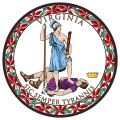Ryan McDougle | |
|---|---|
 | |
| Minority Leader of the Virginia Senate | |
| Assumed office January 10, 2024 | |
| Preceded by | Tommy Norment |
| Member of the Virginia Senate | |
| Assumed office January 11,2006 | |
| Preceded by | Bill Bolling |
| Constituency | 4th district (2006–2024) 26th district (since 2024) |
| Member of the VirginiaHouseofDelegates from the 97th district | |
| In office January 9,2002 –January 11,2006 | |
| Preceded by | George Grayson |
| Succeeded by | Chris Peace |
| Personal details | |
| Born | Ryan Todd McDougle November 9,1971 Hanover,Virginia,U.S. |
| Political party | Republican |
| Education | James Madison University (BA) College of William and Mary (JD) |
| Website | Campaign website |
Ryan Todd McDougle (born November 9,1971) is an American politician. A Republican,he served in the Virginia House of Delegates from 2002 until 2006. He was elected to the Senate of Virginia. Since 2006,he has represented the 4th district,representing six counties and part of a seventh. [1] [2]
